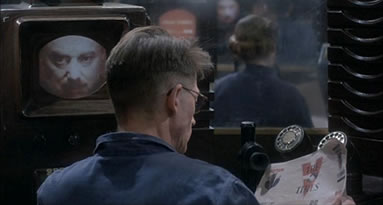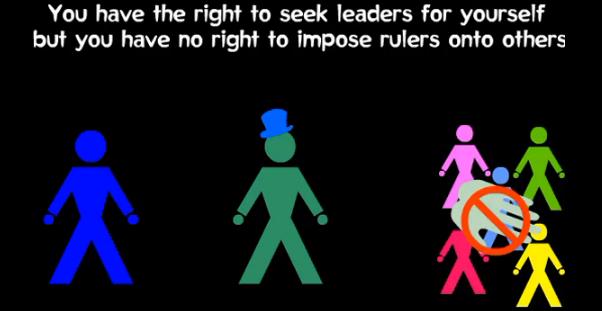What seems to be brewing in the Tea Party movement both intrigues and disturbs me. It's just a straw in the wind, of no real significance itself, but a foreshadowing of something ominous. The Tea Party knows change is needed, but they will never agree on exactly what kind of change, because they have absolutely no underlying philosophy. All the false hope this Tea Party movement is creating impresses me as similar to what was going on in France in the late 1780s. It's a double-edged sword. Of course both the left and the right wings of the Demopublican Party are disasters. But the Tea Party, I’m sad to say, would be no better.
Of course it's nice to see that there are people out there who are unhappy with the status quo, with the so-called two-party system, and with the Republican party in particular. But the process of "throwing the bums out" has gone on since Day One, and it's accomplished absolutely nothing. And more than ever before, government draws the absolute worst type of people and totally corrupts those who might be decent. That's because government is so overwhelmingly powerful today.
Look at what the two major parties supposedly represent. The Democrats definitely don't believe in economic freedom, but they say they believe in social freedom. While the Republicans definitely don't believe in social freedom, but they say they believe in economic freedom. Neither believes in both �" that would make them libertarians.
The only good thing about the Democratic party is that they're at least consistent: they are collectivists and statists through and through, they acknowledge it and think it’s a virtue. They are collectivists in what they say, and they are collectivists in what they do. That gives them the appearance of being more honest than the Republicans, who say they value freedom and the individual. but their actions give lie to those claims, and they thereby give freedom a bad name.
It makes you reluctant to use words like "free market," when you have the likes of the hostile and mildly demented McCain, and the bent and clinically stupid Bush, claiming those principles for themselves…
It adds insult to injury that Ronald Reagan got elected on essentially libertarian rhetoric �" smaller government, lower taxes, getting the state off the little guy's back, etc.�" and then signed appropriations bills that grew the government by huge, then-unprecedented amounts. Many people today think the Reagan years prove that less government is a bad idea. Reagan talked the talk, but he didn’t walk the walk.
It’s a real pity, in that the Reagan team used to say, "If not us, who? And if not now, when?" As it turned out, it wasn't them and it wasn't then. The worst enemies of individual liberty are knaves that claim they're for it but utterly betray it. And incompetents and ineffectual fools who say they're trying to save freedom by increasing the size of the state.

The chances of the Tea Party pushing the center of debate in the right direction are equivalent to a $1 lottery ticket making someone a zillionaire. The French Revolution also probably seemed like a good idea at the time, if only because it wanted to overthrow a totally corrupt
ancien régime. Except after they got rid of Louis XVI, they got Robespierre, and then Napoleon.
The problem with the Tea Party movement is that it has no underlying philosophical basis. Without that sound foundation, it's either going to fail or transform into something ugly. On average, Tea Party members know something is wrong. They're disgruntled, and they want change. Not the Obama type of change �" but what? You just don't know which direction they may go, and there are some very disturbing directions they could end up taking.
They tend to be thoughtless and reflexive. They conflate some muddled feelings of "tradition" with an actual belief system. They operate on a stimulus-response basis. They're religious in exactly the same way as fundamentalist Muslims. And they're hypernationalistic.

They seem to substitute atavistic catchphrases for reasoning. "My country, right or wrong." "Support our troops." That sounds good, until you realize the troops are just a bunch of heavily armed kids who are blindly doing whatever they're told in some fly-blown place they can't even find on a map. The Germans supported their troops when they invaded Poland. "Us" against "them." Wave the flag. The Tea Party people seem to love that sort of thing.
It's likely, in my view, to wind up as a gigantic replay of the Milgram experiment. It's just another dramatization of collectivism and jingoism, and the abnegation of individual responsibility. It's almost a Pavlovian stimulus-response type of reaction, more appropriate to chimpanzees around a watering hole than rational humans who can think things out for themselves.
RELIGIOUS AND CLASS OVERTONES
The very strong religious streak that seems to characterize Tea Party types is a related danger. It's not just religion itself I’m talking about, but a willingness to use the state to impose religious values on society, that I'm afraid is a big element in the Tea Party movement. It can be fine for people to have personal values derived from their religions, but these people are coming together to look for political solutions to every real and imagined problem facing America today. And they seem to combine religion with politics quite easily.

The fact that they are looking for political solutions to the problems they see is, itself, a formula for disaster. If they are successful, they
will pass laws. And maybe, accidentally, some of those laws might do some good, but most of them are going to be just like the laws being passed now: arbitrary, ill-informed, misguided, symptomatic of group-think, and ultimately destructive. They are simply legal manifestations of the psychological aberrations of the politicians who enact them.

If you view religion as the quest for a spiritual reality, I have no problem with it. But, unfortunately, whether in Christendom or the world of Islam, in reality it amounts to thought control and enforced morality. There's a real strain of "old time religion" in the Tea Party movement. I don't think the men who signed the Declaration of Independence would approve.
And that's not all; there's also a bit of a class problem brewing in the Tea Party pot. To use an admittedly broad and somewhat nebulous short-hand, we can say there are three visible classes in America today: lower, middle, and upper. They can be defined many ways, but I’d like to briefly discuss their emotional wiring. Or at least the problematic aspects of the emotions that characterize the classes.
The problem with the lower class is that their emotional level varies between desperation and apathy. Both are destructive forces. It's why most members of the lower classes are cemented there. If you’re apathetic, you feel you have no hope of improvement, and you actually don’t care.
The upper class suffers from a poisonous mix of arrogance, greed, and delusions of superiority. Think of corporate hacks, who are good mainly at back-slapping and back-stabbing, paying themselves multi-million-dollar salaries while the companies they run flounder. I'm a fan of the middle class, made as it is of people who want to work hard, create and run businesses, move up in life, and so forth. When a country doesn't have a middle class, it's in trouble.
But, entirely apart from the fact the U.S. is rapidly losing its middle class �" which is another huge problem �" the American middle class today has a dark underbelly, and that is a deep and driving fear. Fear permeates the middle class today. For one thing, fear of losing what they have; that's a fear that's going to grow like a cancer as the Greater Depression gets worse. For another, fear of outsiders �" Mexicans and Muslims, for example. They fear anything that may challenge or change their culture. Fear is the lowest common denominator of the middle class.
The Tea Party is a middle-class movement that channels this fear into the political arena �" and politics always caters to the lowest common denominator. Fear is very dangerous, it can have all kinds of very nasty results. Fear causes people to act irrationally. Fear causes people to desperately look at the short term and myopically disregard the long term.

There is plenty of self-serving myopia in the Tea Party movement. They want to cut spending �" but not for their Social Security benefits. They want less government �" but they want the government to protect or "create" jobs. They want to close the borders �" forgetting that we're all immigrants. They want a "strong national defense" �" but they forget that fear has already turned the U.S. into a paranoid "national security" state.
The bottom line is that the Tea Party is just a hodgepodge of discontent and grumbling. Tinged with some inchoate rage around the edges. It stands for nothing. It's simply a reaction. It's as laughable as the fascists being against the communists, when they’re just two sides of the same coin.
Unfortunately, there are no political solutions to political problems. To believe there are is like looking for a cancer to cure a cancer. The problem, fundamentally, is that people keep on looking to the government to solve their problems. So they come up with a new party or a new movement, and they propose new laws. This is not just the wrong approach, but the exact opposite of the right approach. The only way to get back on the right track is to undo the expansion of government and interference in the economy we've seen over the last 100-plus years. Repeal the laws, abolish the agencies. Get rid of it all, and free to the market to administer its harsh but effective treatments.
ANARCHY That’s why I believe in anarchy. Yes, I know you’re shocked and incredulous to hear such a thing. But I’m completely serious.
Many people think of anarchy as being chaos. They see riots and violence on TV from some place in conflict and think, "What anarchy!" But violence and bomb throwing are not anarchy, they are chaos. Chaos is the actual opposite of anarchy.
Let’s define the word. Anarchy is simply a form of political organization that does not put one ruler, or ruling body, over everyone in a society. It doesn’t imply the lack of order, only the lack of a ruler. Whether that's actually possible is a separate matter. This is what it means. And I see it as an ideal to strive for.
In point of fact, far from its violent reputation, anarchism is the gentlest of all political systems. It contemplates no institutionalized coercion. It's the watercourse way, where everything is allowed to rise or fall naturally to its own level.
An anarchic system is necessarily one of free-market capitalism. Any services that are needed and wanted by people �" even including the police or the courts �" would be provided by entrepreneurs, who'd do it for a profit.
I'd be happy enough if the state �" which is an instrument of pure coercion, even after you tart it up with the trappings of democracy, a constitution, and what-not �" were limited to protecting you from coercion and absolutely nothing more. That would imply a police force to protect you from coercion within its bailiwick. A court system to allow you to adjudicate disputes without resorting to force. And some type of military to protect you from outside predators.
Unfortunately, the government today does everything but these functions �" and when it does deign to protect, it does so very poorly. The police are increasingly ineffective at protecting you; they seem to specialize in enforcing arbitrary laws. The courts? They apply arbitrary laws, and you need to be wealthy to use them �" although you're likely to be impoverished by the time you get out of them. And the military hardly defends the country anymore �" it's all over the world creating enemies, generally, of the most backward foreigners.
In a free-market anarchy, the police would likely be subsidiaries of insurance companies, and courts would have to compete with each other based on the speed, fairness, and low cost of their decisions.
"Anarchy" is a word that's been stolen and corrupted by the collectivists �" like "liberal." It used to be that a liberal was someone who believed in both social and economic freedom. Now a liberal is no better than a muddle-headed thief �" someone who's liberal only with other people's money.

I refuse to let the bad guys control the intellectual battlefield by expropriating and ruining good words.

In any event, there's no conflict whatsoever between anarchy and the rule of law, since there are private forms of law and governance. That's what Common Law is all about. I’m not saying a truly free, anarchic society would be a utopia; it would simply be a society that emphasizes personal responsibility and doesn't have any organized institutions of coercion. Perfect harmony is not an option for imperfect human beings. Social order, however, is possible without the state. In fact, the state is so dangerous because it necessarily draws the sociopaths �" who like coercion �" to itself.
What holds society together is not a bunch of strict laws and a brutal police force �" it's basically peer pressure, moral suasion, and social opprobrium. Look at a restaurant. The customers pay their checks not because anybody is afraid of the police, but for the three reasons I just mentioned.
It's like when people form lines at movie theaters or ski lifts. There doesn't have to be a cop with a gun there to make everyone take turns. Everyone knows that if they take turns, it all works out better for everyone �" and they are brought up to act that way, so they usually don't even have to make that calculation.
Of course there are always bad actors and criminals. As Pareto's Law indicates, there's inevitably a bad element. 80% of folks are basically decent, and 20% are perhaps problematical. 20% of that 20% are bad apples. And 20% of that 20%, or say 0.8%, are active sociopaths. You have to have a culture that keeps them hiding under rocks, rather than rising to the top �" as they wind up doing quite often in government.
The reaction of a person to the idea of a truly free society is an excellent moral litmus test. The more negative the reaction, the more likely you're dealing with a sociopath.
There is nothing in human nature that makes it impossible to create a society of people who respect each other's rights and follow accepted systems for working out differences, like getting in lines at movie theaters. There would still be criminals and sociopaths to deal with, as these occur as a standard distribution in every population. The point is that the society doesn't have to be built around an essentially criminal organization, the state.
And just because the state does something doesn’t change the morality of the action. If it's wrong for me to point a gun at you and take all your money, then it’s still a crime if a whole bunch of people vote to ask someone with a spiffy uniform and a badge to do the same thing.
No matter how benign a state might be, even one that found a way to fund all of its activities without resorting to force, it must still violate the fundamental human right of self-determination in order to preserve its own existence. That's why the state is inherently a criminal organization �" it must rely on force. Even the best of them are never based entirely on consent of the governed; there is coercion of the non-consenting minority. And there are
always some who do not consent.
Democracy is no solution �" it's just 51% bossing the other 49% around. Hitler was democratically elected. Democracy is just mob rule dressed up in a coat and tie.
I suppose I could live with the idea of a state, as long as there were about seven billion of them in the world �" and everybody had one. That would show that the whole idea of the state is just a scam, where everyone tries to live at the expense of everyone else. But the only people who really benefit are the guys on top.
People say the state is necessary because that's all they've ever known. But it's not, in fact, part of the cosmic firmament. There have been times and places in history when central authority was so distant, or negligent, that the people did function �" and prosper �" in what was essentially a functioning anarchy. David Friedman draws attention to medieval Iceland as one example of this. I recommend his book
The Machinery of Freedom for lots of great discussion on how society would work without the dead hand of the state suppressing it.
The Amish and Mennonites provide other examples, although religious communities are entirely too uptight to suit my taste. Actually, UL (Underwriters Laboratories), as well as CU (Consumers Union) both provide examples of how society regulates itself without the state. People foolishly worry that businesses would all turn rapacious if the state weren't there to regulate them. But electronics producers are
not required to get UL seals on their products. They go to the extra expense of meeting UL standards because they know they'll make more money if their products have the UL seal of approval on them. And everybody wants a good review from CU.
There are lots of private regulatory services. Insurance companies also exert a lot of influence on the insured, who have to go by certain rules to stay insured. And, of course, there's a huge private security industry used by those who want to protect their assets, rather than call 911 after they've been robbed, etc. All by subscription.
You don't need government for anything; if something is needed and wanted, an entrepreneur will provide it for a profit. And do so far better and cheaper than anything a government could possibly hope to.
The economic arguments for a free-market anarchy are overwhelming. I'm of the opinion we'd already be living with the technology of Star Trek if it wasn't for the state slowing things down. But that isn't the reason I'm an anarchist. The real argument is moral and ethical. You don’t need a legislature to manufacture a library of laws and regulations. In fact, I’d argue that you only need one basic law.
What might that be? The most basic law is "Do as thou wilt �" but be prepared to accept the consequences." You can extrapolate that out, as a practical matter, to two others. One, do all you say you're going to do. And two, don't aggress against other people or their property. Everybody understands those laws, and you don't need a corrupt, and corrupting, government to elaborate on them any further, as far as I'm concerned.

[Every month, Doug and his co-editors of
The Casey Report dig deep into the workings of the economic and political machinery to expose dislocations caused by government intervention in the free market. One such force is rampant inflation that slowly eats away at your assets.
Read here how to beat inflation and handsomely profit from crisis investing.]


